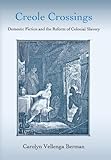Creole Crossings : Domestic Fiction and the Reform of Colonial Slavery / Carolyn Vellenga Berman.
Material type: TextPublisher: Ithaca, NY : Cornell University Press, [2018]Copyright date: ©2005Description: 1 online resource (254 p.)Content type:
TextPublisher: Ithaca, NY : Cornell University Press, [2018]Copyright date: ©2005Description: 1 online resource (254 p.)Content type: - 9781501726835
- 809/.933552 23
- online - DeGruyter
| Item type | Current library | Call number | URL | Status | Notes | Barcode | |
|---|---|---|---|---|---|---|---|
 eBook
eBook
|
Biblioteca "Angelicum" Pont. Univ. S.Tommaso d'Aquino Nuvola online | online - DeGruyter (Browse shelf(Opens below)) | Online access | Not for loan (Accesso limitato) | Accesso per gli utenti autorizzati / Access for authorized users | (dgr)9781501726835 |
Browsing Biblioteca "Angelicum" Pont. Univ. S.Tommaso d'Aquino shelves, Shelving location: Nuvola online Close shelf browser (Hides shelf browser)

|

|

|

|

|

|

|
||
| online - DeGruyter Between the Hills and the Sea / | online - DeGruyter Enlightenment Aberrations : Error and Revolution in France / | online - DeGruyter Warfare in Feudal Europe, 730–1200 / | online - DeGruyter Creole Crossings : Domestic Fiction and the Reform of Colonial Slavery / | online - DeGruyter The Culture of Cleanliness in Renaissance Italy / | online - DeGruyter Shakespeare and the Mismeasure of Renaissance Man / | online - DeGruyter Communities of Memory : On Witness, Identity, and Justice / |
Frontmatter -- Contents -- Acknowledgments -- Introduction. Domestic Fiction and Colonial Slavery -- Chapter One. "Creoles and Creolified" -- Chapter Two. Creole Nation: Paul et Virginie -- Chapter Three. Revising Virginia: Belinda, Indiana, and La Pille aux yeux d 'or -- Chapter Four. Colonial Madness in Jane Eyre -- Chapter Five. Legitimate Families: Uncle Tom's Cabin and Incidents in the Life of a Slave Girl -- Conclusion -- Notes -- Works Cited -- Index
restricted access online access with authorization star
http://purl.org/coar/access_right/c_16ec
The character of the Creole woman—the descendant of settlers or slaves brought up on the colonial frontier—is a familiar one in nineteenth-century French, British, and American literature. In Creole Crossings, Carolyn Vellenga Berman examines the use of this recurring figure in such canonical novels as Jane Eyre, Uncle Tom's Cabin, and Indiana, as well as in the antislavery discourse of the period. "Creole" in its etymological sense means "brought up domestically," and Berman shows how the campaign to reform slavery in the colonies converged with literary depictions of family life. Illuminating a literary genealogy that crosses political, familial, and linguistic lines, Creole Crossings reveals how racial, sexual, and moral boundaries continually shifted as the century's writers reflected on the realities of slavery, empire, and the home front. Berman offers compelling readings of the "domestic fiction" of Honoré de Balzac, Charlotte Brontë, Maria Edgeworth, Harriet Jacobs, George Sand, Harriet Beecher Stowe, and others, alongside travel narratives, parliamentary reports, medical texts, journalism, and encyclopedias. Focusing on a neglected social classification in both fiction and nonfiction, Creole Crossings establishes the crucial importance of the Creole character as a marker of sexual norms and national belonging.
Mode of access: Internet via World Wide Web.
In English.
Description based on online resource; title from PDF title page (publisher's Web site, viewed 26. Apr 2024)


